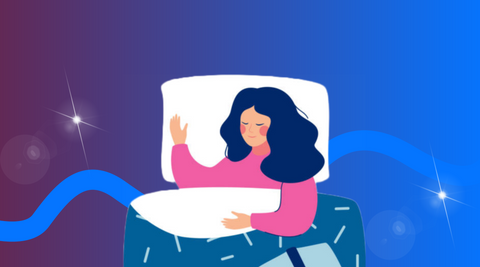Our modern way of life has increased our exposure to blue light, and most light bulbs in the home and office emit blue light. This is harmful to your eyes and disrupts your sleep.
That’s because artificial lighting can introduce melatonin-suppressing blue light, which tricks your body into thinking it's daytime when it isn't and makes it more difficult to sleep. It's important to understand what light you're being exposed to, especially if you're not outside a lot. You should limit your exposure to blue light, which is why wearing blue-light-blocking glasses and adding blue light filters to screens are so popular — however, once the sun goes down, there can be other sources of blue light in your home, including your light bulbs, which is why many people have begun adding blue light lamps and bulbs into their homes.
In this article, we'll look at the impact of bluelight, why it's so bad for our sleep, and the advantages of investing in a blue light lamp.
What is blue light?

Blue light is the type of light along the visible spectrum that is known for its short wavelength and strength. It’s naturally present in sunlight, sending signals to our brain that we should be awake and alert during the day.
However, it’s also prevalent in the digital devices we spend so much time looking at, and this can send our brain many mixed messages. For example, blue light overstimulates our eyes and inhibits our brain’s production of melatonin, the chemical which helps us sleep soundly. The result is a wonky body clock, tired eyes, and a lot more trouble getting to sleep.
Why is blue light bad for sleep?
During the day, blue light lifts our mood and energy levels. This may sound like a positive, but as soon as daytime turns into night, it becomes the enemy. In fact, several sleep studies show that there’s a strong link between blue light and sleep deprivation. The main reason? It disrupts our circadian rhythm.
Disrupted sleep rhythm
Our circadian rhythm is a natural body process that regulates the sleep-wake cycle, and repeats every 24 hours. It’s important for brain activity, cell regeneration, hormone production, and our sleeping patterns. However, when we scroll through our digital devices, the blue light emitting from the screen interferes with these natural rhythms, and too much of it in the evening is disruptive.
Is there a solution?
Since blue light is linked to rising cases of insomnia and damage to the eyes, you might think a suitable solution would be complete abstinence from smart device usage at night. However, there are alternatives, especially for those who simply can’t abstain.
Blue light lamp benefits
The benefit of blue light blocking lamps is that you are removing signals that interfere with sleep, allowing the body clock to naturally take over and ensuring that your body's natural rhythms are not disrupted when you are attempting to fall asleep.
So, what are the tangible benefits of blue light lamps and why do you need them in your home? Let’s delve into the various benefits blue light lamps can add extra love and light to your eyes and sleep.
Can improve sleep
Blue light improves our mood and energy levels during the day. This may appear to be a positive, but once day turns to night, it becomes an enemy. Regulating blue light exposure can improve sleep quality and duration, allowing for a longer and deeper night's sleep.
Great for wellbeing
The sun's light has numerous known health benefits, including healing, hormone balance, and body restoration. So, for wellbeing to function, a regulated light that mimics natural light is required. The wrong lighting in your home can cause depression, headaches, anxiety, sleep disorders, obesity, cancer, and other health problems.
Reduces headaches and fatigue
Shielding your body from the harmful effects of blue light can improve your health by reducing headaches and fatigue caused by blue light exposure. As a result, your health, wellness, and quality of life will improve.
Conclusion
So, will a blue light lamp aid melatonin production? Reduced blue light exposure can improve both sleep quality and quantity, according to research. At Ocushield, we have a portable all day and night bluelight blocking lamp that will help you keep alert during the day and doze off quicker at night, ensuring a restful sleep. Our low blue light lamp helps you keep your body clock in time, by controlling how much blue light it gives off, with three settings for different times of the day.
To sum up, blue light is a nuisance to our sleeping patterns, but by reducing your exposure, you can set off to dreamland at the appropriate time.
How we reviewed this article:
Ocushield has strict sourcing guidelines and relies on peer-reviewed studies, academic research institutions, and medical associations.
Our experts continually monitor the health and wellness space, and we update our articles when new information becomes available.


Leave a comment